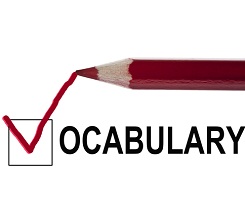Simple Ideas for Building Vocabulary
- July 19, 2012
- By Gail Terp
 Readers, new and experienced, often run into difficulties when they aren’t familiar with the vocabulary used in their reading. They may be able to decode the words (sound them out) but if they don’t know what the word means, they’re going to have problems.
Readers, new and experienced, often run into difficulties when they aren’t familiar with the vocabulary used in their reading. They may be able to decode the words (sound them out) but if they don’t know what the word means, they’re going to have problems.
Running into unfamiliar words occasionally is a good thing – it’s what helps us grow as readers. Running into them repeatedly makes us want to just set the book down…permanently.
The two most powerful tools for increasing vocabulary are conversation and reading. Don’t hesitate to throw in some challenging words when you converse with your children. They’ll either figure them out in context or ask you about them. And when they use a word you’re unfamiliar with (lots of kids’ slang is a mystery to us adults…) don’t be afraid to ask what the word means. By modeling this “asking” behavior, your children may be more willing to ask when they don’t know a word.
Reading can give a huge boost to vocabulary. Whenever we read, we come across unfamiliar words. When this happens, we either 1) figure out the meaning in context, 2) stop to look it up, or 3) decide it is isn’t important and read on. When that word comes up again, we use whatever we learned the first time we saw it to help us in this new context. After more exposure, the word creeps into our speaking vocabulary. This works for kids as well as adults.
Read alouds are especially powerful for building vocabulary. Even if your child is a proficient reader, read alouds are a wonderful practice to continue. I could write lots about this subject but for now, I’ll just praise read alouds for their power to boost vocabulary.
Kids are interested in all sorts of topics. Sometimes the books exploring these topics can be too hard to read, but not too hard to understand. When you read a book aloud, you can stop and talk about the new words. Don’t know the word either? See if you and your child can figure it out from context or look it up. Or, if it doesn’t really seem to matter, just keep reading.
Here are some other suggestions for vocabulary building at home. Consider trying one or more of them.
ORGANIZE
Present words in related groups. Our brains like new information to be organized. Try brainstorming words that fit into categories.
GAMES
Games are great! For these games, create a list of target words (school vocabulary, fun words, words related to a current passion…whatever you like) and post them for everyone to see.
Pictionary
* Whoever is it chooses a word from the list and starts drawing.
* The other players can guess at any time but can guess only once until everyone has had a chance to guess. Then they can guess again, if no one has guessed correctly
* Once someone guesses correctly, both the drawer and the guesser get a point.
Charades
* Same rules as in Pictionary, except you act the word out instead of drawing it.
Vocabulary Bingo
* This works best with more than 2 players. Collect words to learn/reinforce, plus their definitions (ex. agrarian: having to do with farming or rural life) or sentences that include them (ex. A farming community is an ______ community. [agrarian])
* Write the words in random order on bingo sheets (paper marked into grids of 9 or 25 squares).
* Write the words and their definitions (or fill-in-the-blank sentences) on index cards.
* Take turns being the caller (important!). The caller reads the definition and the others mark the words on their bingo cards.
* The first one to get a vertical, horizontal or diagonal line of markers wins. Markers can be squares of paper, buttons, coins, whatever.
Go Fish Games (basic rules)
Synonyms
* Together, create cards by writing pairs of words that mean the same on index cards, one word per card.
* Play Go Fish, except instead of asking “Do you have a 3?” you’ll ask, “Do you have a word that means the same as (or is a synonym for) happy?”
Antonyms
* Same as above, just create pairs of antonym (opposites) cards.
WEBSITES
This site has a ton of games, so explore to find the ones your child likes.
This is a very cool vocabulary website and one I’ve been playing for years.
I hope you find some fun ways (fun is important!) to ease more words into your child’s vocabulary. Chances are you’ll learn new words too!